Interview
Interview: Nell Brookfield
In conversation with London-based artist Nell Brookfield.
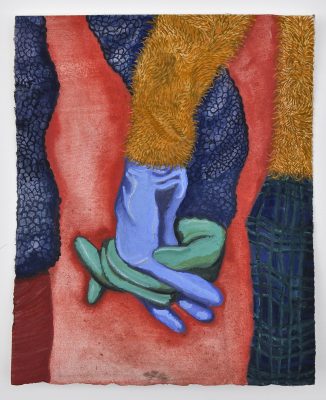
Pigment on Paper, 25.4x31cm
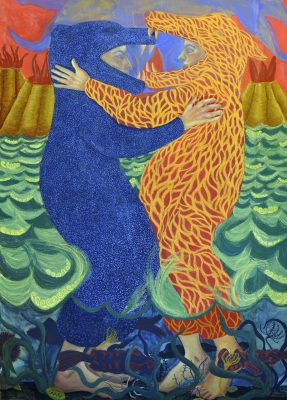
Pastel and Pigment on Paper, 195x142cm
Can you talk about your journey into or interest the arts?
Art has always been a lifeline for me. I always drew and was lucky to have parents that took me to museums, helping me to feel comfortable in those spaces from a young age. I remember being five and being both terrified and excited by Louise Bourgeois’s ‘Maman’ spider in the Tate Modern; that was the first time I began to understand how many rules art allowed you to break.
As we grow older it becomes increasingly difficult to access the imaginary worlds so many of us lived in as children. Both consuming and making art is a way of accessing that headspace again and allowing a certain freedom that is so easily lost as we become adults.
Though I never stopped drawing, I didn’t have the confidence to go into art education for Foundation or Undergraduate. I was familiar with the Royal Drawing School after attending classes there as a teenager, and felt that I was able to find my way as an artist when I started the Drawing Year there in 2017. This has deepened my belief in the importance of education, it only takes one voice along the way to set you on a different path!
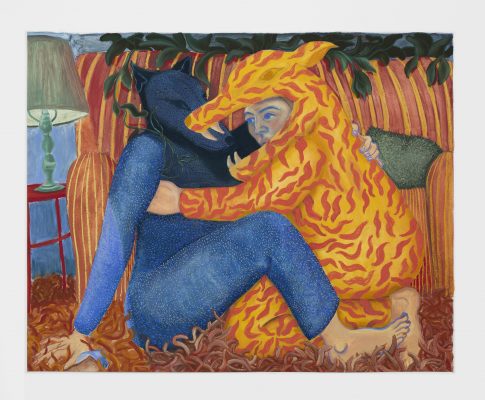
Pastel and Pigment on Paper, 127x94cm
Do you use a sketchbook? I’m interested in what a sketchbook means to you and your work?, or how people develop their ideas.
I always carry a sketchbook with me to jot down ideas, sketches from imagination and memory, or to do observational drawings. I then take these back to the studio where I will work from them. These rough drawings act as the scaffolding for my work. Hardly anyone ever sees my sketchbooks, so what goes into them is probably the most carefree work I do. Sometimes it’s hard to find total privacy when making studio work, because somewhere in the back of your head you know it might be seen by others, but a sketchbook is a very private and organic space. Which is why I love seeing sketchbooks on display in retrospectives and exhibitions. I think it’s often the most vulnerable work you will find by any artist.
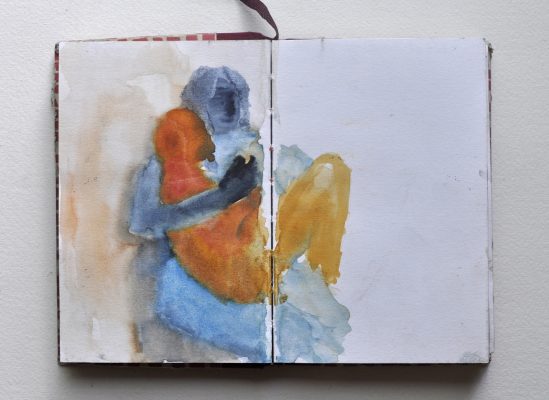
You originally studied anthropology, and you can see that in your work. The idea of studying behaviour is very much apparent, although I guess illustration allows you to create imaginary scenarios and patterns. Can you talk about the relationships (if there are any) between your art practice and the more scientific side of your work?
When I started studying art, after having studied Anthropology, people kept asking me if I would try and marry the two disciplines together. I see them as completely intertwined; both look at what is around you and try to make sense of it.
My work often reflects on moments I have observed or experienced, just as my ethnographies did. Whilst studying Anthropology I was always fascinated by the culture directly around me, rather than looking further afield. I ended up researching blood donation in the UK and investigating whether football was a modern religion. I would always seek out topics I didn’t fully understand, in an attempt to figure them out.
Now I am probably doing the same, concentrating on occurrences I can’t fully grasp, but begin to understand them as I paint them. I draw in soft pastel and paint with pigment on paper, and the intense colours that I use, and patterning, accentuate the charged moments between my figures.
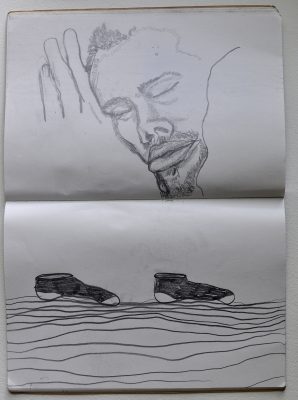
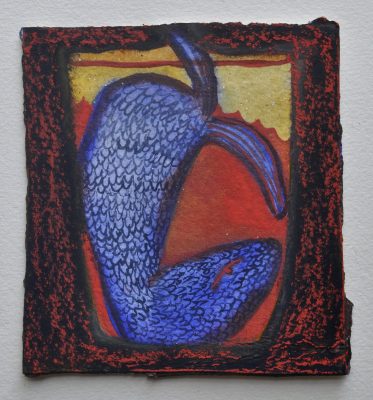
Can you talk about your process of working. How do you work, how often, is there a particular pattern?
I bring together what I have imagined, remembered and observed. I draw everyday and keep these on my studio walls. I feel then that I have brought the little fragments of the world outside into my studio, which will then hopefully spark new ideas and compositions, or find their way into paintings. I try and weave the three ways of working together as much as possible.
If I can get into the studio everyday, even just to have a look at the work that’s in there for ten minutes, then that feels very positive. Of course life doesn’t always allow that.
If I can, I will aim to have a 9-5 studio day, and stay late if I feel energised. Having a studio practice is funny because you will inevitably have days that go horribly wrong, but that will eventually lead to a successful day. So for me it’s about consistent time spent in the studio, having faith it will go well if I stick at it, and carrying a sketchbook with me when I can’t be in there. I also keep all of the bad work for longer than I want to, in case I change my mind about it with hindsight, and as a reminder that they are part of the process.
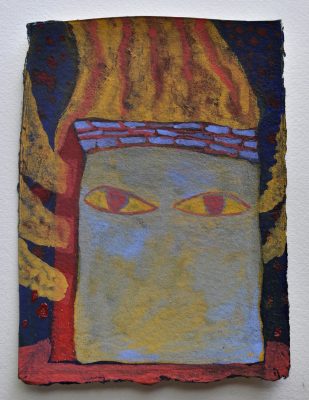
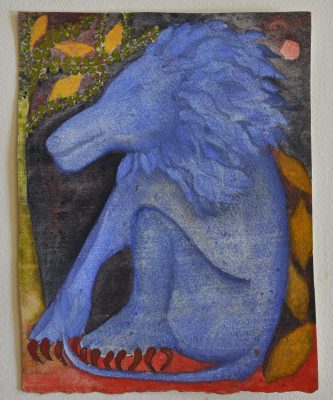
Do you find the process of creating work relaxing or therapeutic? I’ve become increasingly interested in the relationship of the sketchbook and the work to the artist.
I think there are aspects of sketchbook work and painting that are relaxing, but very often the wider process is full of hair tearing and painting ripping frustration. This is balanced out by the good days, which make it worthwhile. Frustration in the studio is often positive as it leads to new ideas and pushes you into different ways of solving problems.
Certainly once the work has been made, especially if it’s about something I’m trying to understand better, it is often cathartic. Getting lost in patterns and colour and observational drawing can be close to meditation, but this isn’t a consistent feeling.
I remember in the more intense observational classes at the RDS, where you could be sitting still and looking for hours, often being very emotional. I think it was partly because you are so alone with your thoughts in that time, but also we are often not necessarily used to that sort of stillness and concentration today.
Sketchbooks work is very unique, however, because there is such a relaxed and private feeling within them, so the artist is really just doing it for themselves, unselfconsciously; so yes, I think I do find sketchbook work relaxing and therapeutic, in contrast to studio work.
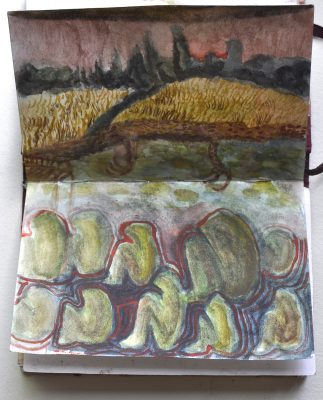
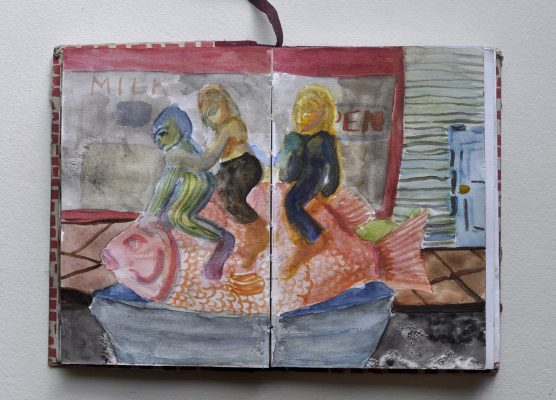

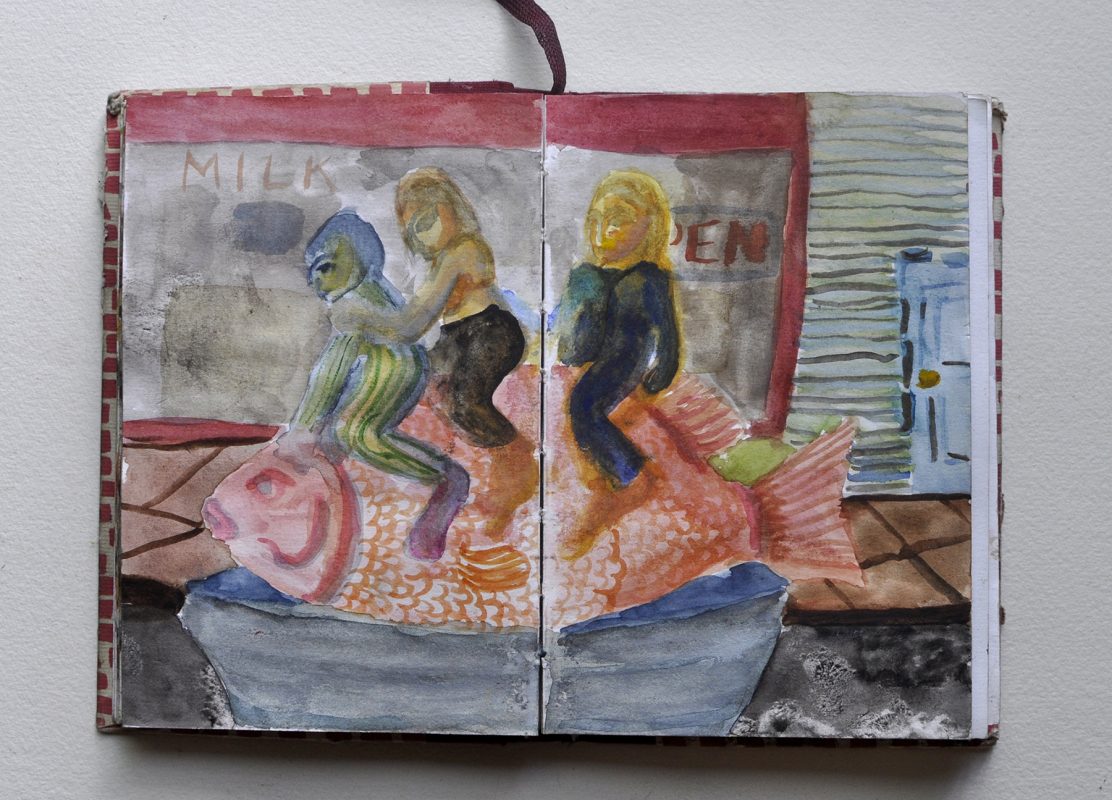
Do you like this artist?
If so, why not write a comment or share it to your social media. Thanks in advance if you can help in this way.